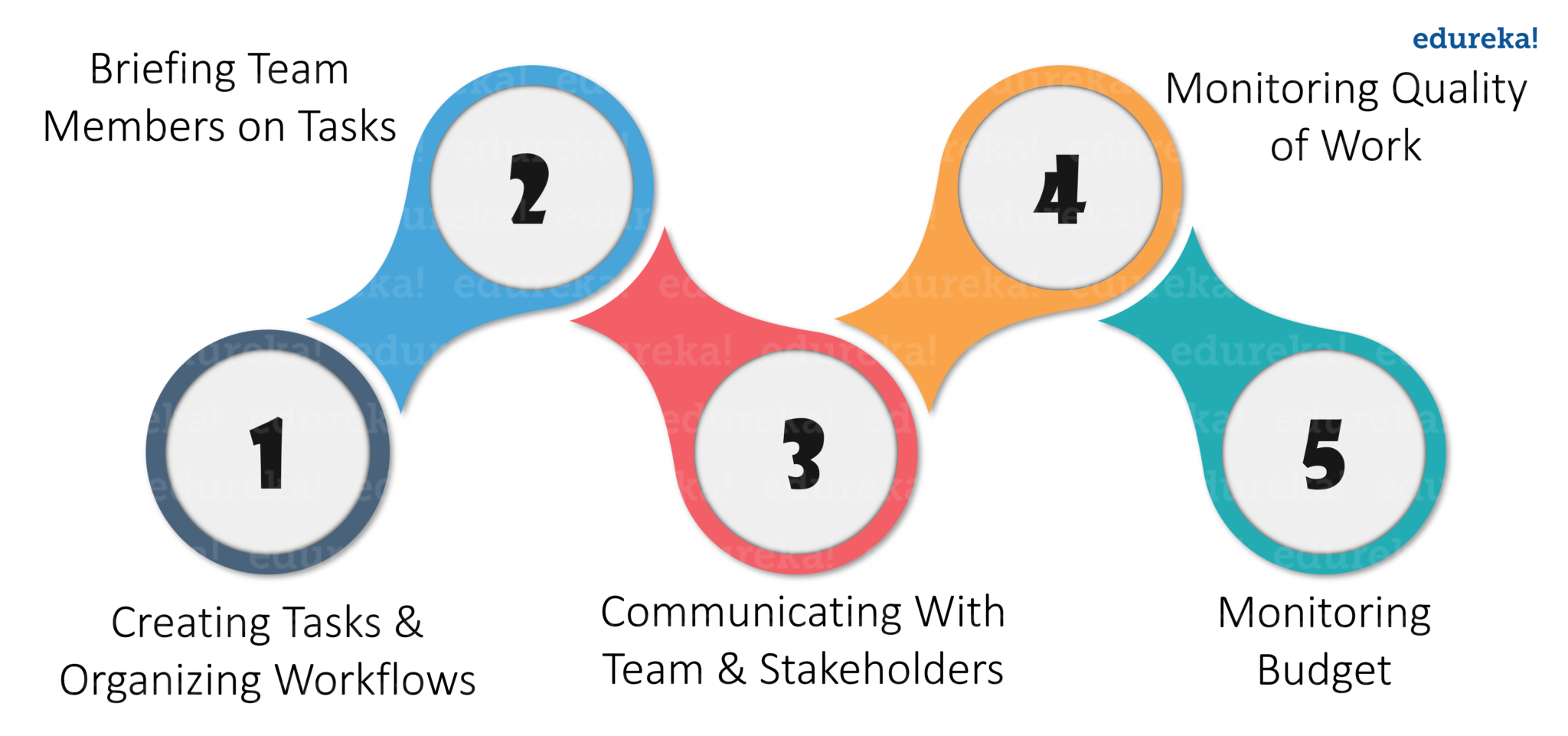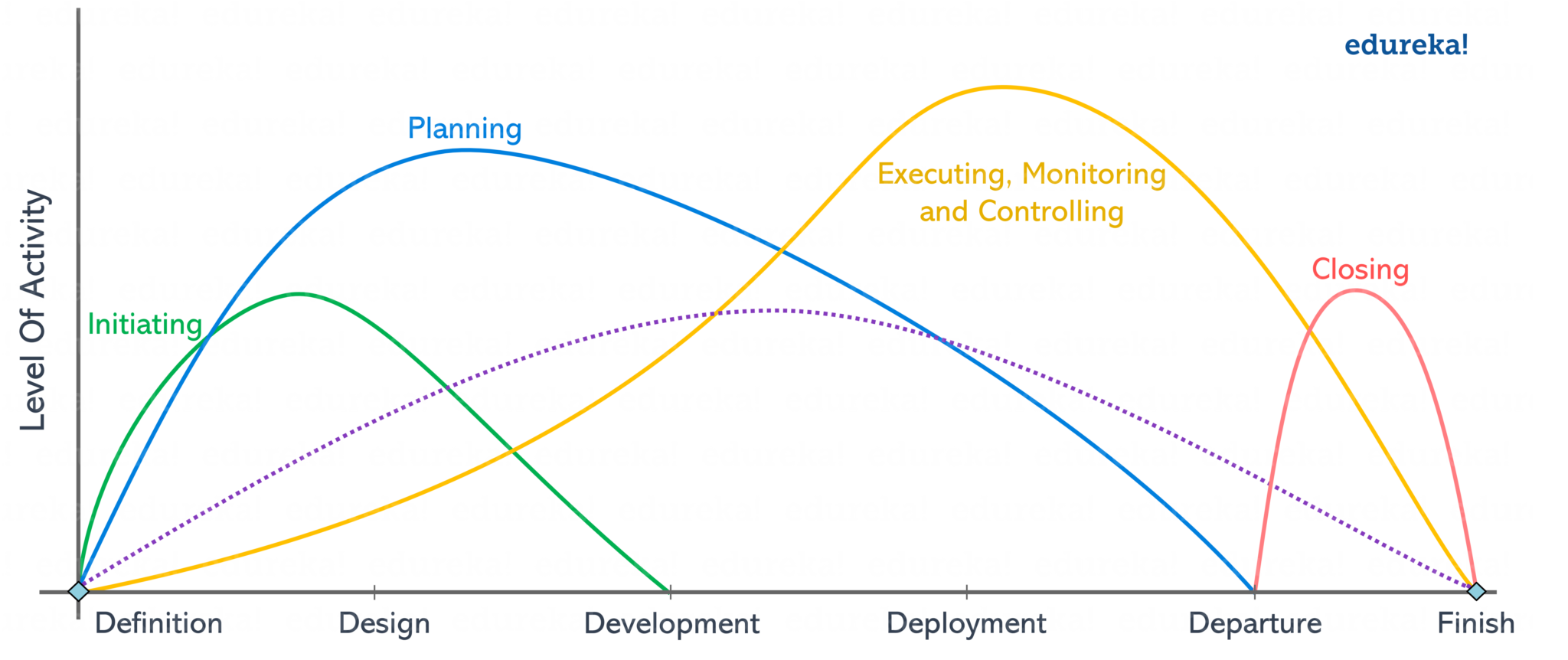PMP Certification Training
- 87k Enrolled Learners
- Weekend/Weekday
- Live Class
Project Management in an extensive network of task and activities that need continuous monitoring and management. To structure the efforts and simplify them into a series of logical and manageable steps, this prolonged process is broken down into various phases. All these phases together, frame the complete Project Management Life Cycle. Through the medium of this article, I will help you to drill down into each of the project management life cycle phases.
Being a Project Manager, it is very important to have a thorough knowledge about each of these phases for delivering a successful project. If you are aspiring to become a certified project manager you can check out our PMP Training that will help you to embark on your journey to acquire Project Management Certification.
You can also check out this video to get a detailed explanation of the Project Management Life Cycle by a PMP® certified instructor.
This video will give you a complete insight into the various phases of a project life cycle.
Let’s now dive deeper into each of these phases and explore the detailed network of processes in the Project Management framework.
Initiation is the very first and vital phase of a project management life cycle as it defines the processes that are needed, to start a new project. In this phase, upper management defines the purpose and scope of the project, provides the reason for initiating and the develops the business case.
The initiation phase of the project management life cycle generally comprises the following steps:
 Let’s now understand each of these phases in detail.
Let’s now understand each of these phases in detail.
First, you need to understand the feasibility of your project i.e what is the business problem and whether this project provides the solution to that particular problem or not.
Once you are done justifying your purpose of the project, the next step is to define its scope. Here you will be identifying your project scope and define its depth and breadth. By defining I mean, you need to determine and document a list of specific project goals, features, functions, tasks, deadlines, risks, and ultimate costs.
The next step is to identify and define the deliverable. Deliverable here stands for the final product or services that your project is supposed to produce.
Since you have already identified the scope and deliverable of your project, you can proceed ahead. Your next step will be identifying the people who are concerned with the project and how this project will affect them and their needs. Note that, the stakeholders in a project hold an important place. By the end of your project if they are not satisfied, then your project is not considered as successful.
Now that you have already identified the vital pillars of the project, the next step is to connect the dots and develop a full-fledged business case to move forward. Also, you need to start structuring the team as well, that would shoulder this project. Finally, you are required to create SoW(Statement of Work) to wrap up the Initiation phase.
Once you have all these steps, you will be ready to move forward with the second phase of the project management life cycle.
Join PRINCE2 Training and learn about PRINCE2 Phases, Lifecycyle, and Themes.
Planning as the name suggests, is the phase where the proposed project solution is curated further in much more detail. This is done while keeping the project’s objective as the final goal at heart. In this phase, you will be breaking down the business case and SoW into smaller tasks. Then assign them to respective teams and prepare a schedule for timely completion of these activities.
So, basically you need to perform the below steps to successfully conclude the planning phase of the project management life cycle:

This step will start by identifying all the tasks that are required to fulfill the project’s objective. Tasks like determining the activities, dependencies, time frame, potential risks and constraints involved in the project completion are outlined here.
Next, you will be developing a suite of planning documents that will help in visualizing your project timeline. It will guide your team throughout the project development till delivery, via key milestone indicators.
This is an essential phase where the cost estimation is done and a final budget is revealed. Project budget will be covering all the expenses spent on labor, equipment, and materials. It will help in monitoring and controlling the cost expenditures throughout the project development while ensuring the maximum profit.
This step includes curating your final functional team selected from internal and external talent pools of your organization. You also need to ensure that your entire team is well equipped with the necessary tools in order to complete their allotted tasks.
After curating a timeline, estimating cost and gathering resources, the next big step is to estimate the potential risks. Estimating risks is one of the most important tasks during project planning. If you proceed without proper risk management, it may hamper your project performance or even pose threat to its successful completion. But, with proper risk management, you can mitigate the risks and deliver your project of agreed quality without any delays.
The next phase is the execution phase in the project management life cycle that I will be discussing in the next section of this article.
Remember this, when I say executing phase, it includes controlling and monitoring as well. It is an extensive phase where your project plan will be actually put into action. In this phase, the final deliverable start taking shape and at the end is handed over to the customers. The main purpose of this phase is to keep the work the on track, organize the team, ensure that the progress is not falling behind the schedule.
The Execution phase of the project management life cycle consists of the below steps:

In this step, you need to assign the project tasks to the appropriate resources while distributing the work equally among the team members. This will endure that no one is burdened and is capable of producing the quality results.
Once you are done assigning the tasks, the next step is briefing each of your team member about their role and importance of their task in the project. You will have to guide them in their respective roles and provide support by arranging process-related training if required.
Maintaining proper communication is a vital part of the project success. You have to maintain two-way communication between the stakeholders and the team throughout the project.
Once the execution begins, you have to keep monitoring each and every activity of the project. It will give you an upper hand in noticing if something goes off the track and provide you space to update or adjust your schedule. By monitoring, you can ensure the quality of the work and the final product.
Now, in order to manage the cost and wrap up the project within the budget is a challenging task. But if you keep a close eye on the project expenses then you can easily keep your project on track in terms of assets and resources.
Once the executing phase is done and your final product is ready for the delivery, you will enter the final phase of the project management life cycle i.e Closure.
If you want to go beyond the basic level & want to make a career in Project management, you should definitely check out our PMP Training Below!
Find out our PMP Training in Top Cities/Countries
| India | Other Cities/Countries |
| Bangalore | UK |
| Hyderabad | US |
| Pune | Canada |
| Chennai | Australia |
| Mumbai | Singapore |
| Kolkata | Saudi Arabia |
During the closure phase, your main focus should be on the release and delivery of the final product. Once the product is handed over to the customers, you can release your resources, finalize the documentation and officially close the project.
Below are the detailed steps that are covered during the closure phase of the project management life cycle:

Before you hand over the final deliverable, you need to analyze whether the project’s objective is achieved or not. Which means whether your product is capable of solving the initial business problem. Also, you need to ensure that the project has completed on time and within budget.
Also, you have to keep track of the performance of each team member. You can do this easily by monitoring their timeliness and the quality of work they delivered throughout the project.
Documentation is another important procedure that shouldn’t be overlooked. You must create project documentation in a systematic way to ensure that all the aspects of your project are closed, leaving no loose ends. You can provide this document to the key stakeholders to report the signing-off of the project.
Once you wrap up your project, you need to perform a final analysis on it. This type of analysis will help you in gaining meaningful insights and wisdom of experience. You can use them as a reference in the future for similar projects.
Sometimes, even after the completion of the project, there are some unused resources and budgets. You can assign these resources for some future projects. It will help you in reducing the cost and resource wastage.
This concludes the entire project management life cycle. In case, you are worried about how you will be able to handle all these project management tasks single-handedly, then this is a must read an article on Project Management Tools. One thing you must note here is that all these phases don’t proceed in a step by step manner. They often overlap with different level of activities going on during each phase. To give you a better insight, I have used the below graph which depicts the same.

With this, we come to an end to this article on Project Management Life Cycle. I hope this gives you a complete insight into the various phases of project management and helped you in understanding them in detail.
If you found this “PMP® Certification Exam” article relevant, check out the Project Management Masters Program by Edureka, a trusted online learning company with a network of more than 250,000 satisfied learners spread across the globe.
Got a question for us? Please mention it in the comments section and we will get back to you.
 Thank you for registering Join Edureka Meetup community for 100+ Free Webinars each month JOIN MEETUP GROUP
Thank you for registering Join Edureka Meetup community for 100+ Free Webinars each month JOIN MEETUP GROUPedureka.co